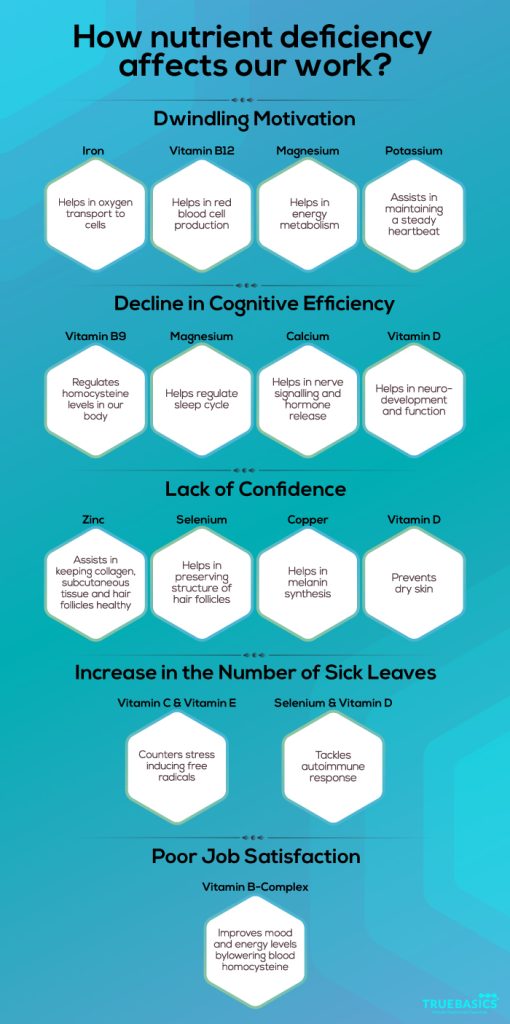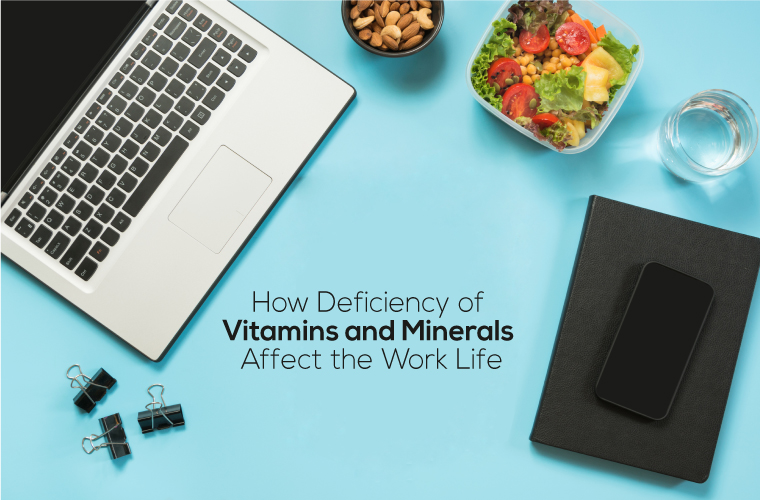In today’s day and age, life is fast and compartmentalized. The modern Indian is a hard worker striving for efficiency. A survey by the National Sample Survey Office reported that the average working hours of Indian employees are one of the longest in the world, with people in the city working for 53-54 hours per week [1].
Even though work seems to take the biggest chunk of our life, often we might feel like we are unable to tap into our true potential and perform to our full capacity. We might feel stressed, low on energy, not motivated to work and often suffer from illness. External factors like workplace environment, peer pressure, demanding job, group dynamics, bad habits, and personal contingencies are the most cited reasons for our unhappiness at work.
We might think that we’ve tried everything and yet we’re feeling low energy, stress, or just not feeling “well”. If this sounds familiar then you might want to look back at your dietary patterns, food habits, and nutrition intake. Unbalanced nutrition and nutrient deficiencies are the most overlooked factors which have the potential to disrupt our work life. Vitamins & minerals play an important role in our body like maintaining immunity, fighting oxidative stress inducing free radicals, energy metabolism to supporting our skin & hairs. Vitamin & mineral deficiencies coupled with irregular lifestyle patterns and stress can negatively affect our performance at work.
How does nutrient deficiency affect our work?
1. Dwindling motivation to work
There are times when no matter the reward or deadline, the task just won’t happen. We might not be feeling “excited” or “energetic” enough to finish the task. A low level of motivation, among other external factors, could be due to low energy levels in the body.
Lack of energy often translates itself into low motivation and could be an outcome of Iron, Vitamin B12, Magnesium, Potassium deficiency.
Iron is an important component of haemoglobin, the protein in red blood cells that help transport oxygen throughout the body. Cells use oxygen for metabolism reactions and generating energy. An Iron deficiency in the body can lead to low levels of red blood cells, thereby depriving body cells of the necessary oxygen for metabolism reactions. This can result in low energy levels, constant tiredness, loss of appetite and fatigue.
Vitamin B12 also plays a significant role in the production of red blood cells. Vitamin B12 deficiency can cause a reduction in red blood cells and prevent them from developing properly, thereby, leading to low energy levels. Vitamin B12 deficiency can manifest itself in the form of megaloblastic anaemia.
The body uses Magnesium as a cofactor for important enzymes that are involved in energy metabolism reactions producing Adenosine Triphosphate (ATP), the cell’s energy currency.
Potassium assists in maintaining a steady heartbeat; ensuring the constant circulation of blood and oxygen throughout the body. The body experiences a decline in energy production in case of deficiency of either of the minerals.
2. Cognitive decline
Interacting, discussing and brainstorming are at the heart of most jobs. They require mental and physical presence, passion and zeal. While many external factors can be the reasons behind occasional slip-ups, a continuous inability to concentrate and being mentally present in discussions might suggest a deeper cognitive decline on the horizon. Some subtle characteristics include irritability, inability to concentrate or make decisions, foggy headspace, confusion, and disturbed sleep patterns.
Our body might face difficulty in performing cognitive functions due to low levels of Vitamin B9, Magnesium, Calcium and Vitamin D.
Vitamin B9 (or Folate) regulates the amount of homocysteine in our bodies. Excess of homocysteine is associated with cognitive decline and dementia [2].
Magnesium is also responsible for calming our mind and body. It stabilizes the membranes of the nerve cells and plays a major role in the formation of melatonin, the hormone that regulates our sleep cycles.
Calcium plays a key role in transmitting messages in nerves and muscle contraction. Deficiency of Calcium can disrupt the normal nerve signalling and affect the hormone release. This can manifest itself in the form of irritability, depression and other mood disorders [3].
Vitamin D may help in preserving the neurological development of the brain [4].
3. Increase in the number of sick leaves
Often, we wake up in the morning, groggy and tired. The body hurts in random spots and what we thought of as cumulative fatigue turns out to be a fever and the ignored infection spreads. Our demanding work life often includes skipping meals, irregular sleep cycles, stress, and quick bite fast foods. When our body is unable to keep up with the demands of the job, it expresses so in the form of compromised immunity and increased inflammation.
A diet rich in Vitamins C, Vitamin D and Vitamin E along with Selenium can alleviate low immunity levels, counter inflammation and combat stress induced free radicals.
Vitamin C and Vitamin E work in synergy as a powerful antioxidant duo, countering free radicals that induce oxidative stress in our body making it susceptible to sickness.
Selenium [5] and Vitamin D help tackle autoimmune responses and chronic inflammation.
4. Poor job satisfaction
It is rare to come across people who do not complain about their work life. After all, stressed Indians account for 15% of global mental health related disorder burden [6]. Scientists are investigating the role of nutrition in alleviating distressing symptoms.
Low energy levels and mood are symptoms of stress. High doses of Vitamin B-complex, containing all eight B vitamins, have been suggested to improve mood and energy levels by lowering blood levels of homocysteine [7], [8], [9].
In a study conducted over 12-weeks with people experiencing work related stress, supplementation with Vitamin B-complex reduced stress symptoms like depression, anger, and fatigue [10].
5. Lack of confidence
The hesitation to put our best foot forward often stems from a lack of confidence. Waking up to a new pimple or losing hundreds of hair strands in the shower daily can take a toll on our confidence. Gradually, making oneself look presentable in the workplace gets harder, but nutrition can bolster us from within.
Zinc, Selenium, Copper and Vitamin D play vital roles in supporting skin & hair health. A diet deficient in these nutrients can aggravate skin & hair issues.
Zinc is a cofactor for over 1000 enzymatic reactions that assist in cell growth and development. It keeps collagen, subcutaneous tissue and hair follicles healthy. Zinc is also considered as a top contender for an alternative acne treatment [11]. Zinc deficiency usually manifests in the form of hair loss and breakage, along with dandruff and dryness.
Copper is a trace mineral that help tyrosinase enzyme convert tyrosine to melanin, which gives colour to the skin
Selenium is a trace element that is necessary for protein synthesis. Its potent antioxidizing properties preserve the structure of hair follicles. Lack of selenium can cause sparse hair growth, progressive hair loss and sloughing of nails [12].
Vitamin D prevents dry skin by curtailing excessive keratinocyte growth and stimulates the creation of new follicles.

So, what should we do?
Having a balanced and vitamin & mineral rich diet can help tackle the deficiency induced factors that affect our work. We must include whole foods, green leafy vegetables, nuts and seeds, citrus fruits, and sunshine as part of the daily routine.
Combating these deficiencies also requires certain lifestyle changes and the development of simple habits. Tracking your meals, following a consistent meal and exercise plan, managing portion sizes, managing sleep time, reducing the consumption of alcohol and getting regular exposure to the sun can help in your journey of tapping your true potential.
In conclusion…
A survey by economic times reported 89% of the Indian population to be stressed [13] and urban diets have been found to be lower in Zinc, Vitamin A, Vitamin D, Iron, Calcium and Vitamin B-complex. The body under stress will overutilize Vitamins B-complex and Vitamin C, along with Magnesium, and their levels will deplete.
While external factors certainly affect our work life, nutrition is often the most overlooked one. Optimal nutrition is necessary for our health, productivity and performance and therefore close attention should be paid to our diets. Ensuring a balanced diet, using a variety of cooking techniques and inculcating healthy habits is the only long-term and viable remedies. Not only will this improve life expectancy by strengthening immunity and reducing the frequency of falling sick, but it will also maximize energy usage, improve one’s mental and cognitive faculties, and slow the effects of aging for general well-being.
#ShareIfYouCare #RepublicofDeficiency
Sources:
[1] https://www.business-standard.com/article/current-affairs/working-hours-in-india-one-of-the-highest-in-the-world-shows-nsso-report-119022700826_1.html
[2] https://www.ncbi.nlm.nih.gov/pmc/articles/PMC5120319/
[3] https://www.ncbi.nlm.nih.gov/pmc/articles/PMC2738337/
[4] https://www.ncbi.nlm.nih.gov/pmc/articles/PMC6132681/
[5] https://www.ncbi.nlm.nih.gov/pmc/articles/PMC3277928/
[6] https://economictimes.indiatimes.com/magazines/panache/mental-health-in-india-7-5-of-country-affected-less-than-4000-experts-available/articleshow/71500130.cms?from=mdr
[7] https://www.ncbi.nlm.nih.gov/pmc/articles/PMC4290459/
[8] https://www.ncbi.nlm.nih.gov/pmc/articles/PMC4772032/
[9] https://www.ncbi.nlm.nih.gov/pmc/articles/PMC6316433/
[10] https://www.ncbi.nlm.nih.gov/pubmed/21905094
[11] https://www.ncbi.nlm.nih.gov/pubmed/29193602
[12] https://www.ncbi.nlm.nih.gov/pmc/articles/PMC5315033/
[13] https://economictimes.indiatimes.com/magazines/panache/89-per-cent-of-indias-population-suffering-from-stress-most-dont-feel-comfortable-talking-to-medical-professionals/articleshow/64926633.cms?from=mdr













